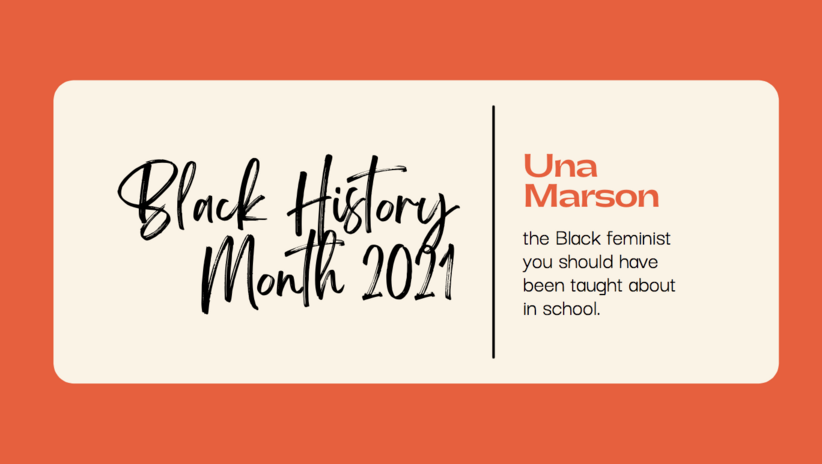Una Marson:
Una Marson (1905-1965) was a Jamaican writer and activist who made a significant contribution to Black feminist thought and Black internationalism. Yet, despite being a leading Black intellectual in the 20th Century (alongside the likes of C.L.R. James and Dr. Harold Moody), Marson’s pioneering works have largely been erased from history.
ACTIVISM:
Marson in London
In the 1930s and 40s Marson lived in London, and as the ‘heart of Empire’, Marson’s experience in the imperial metropolis acted as a nexus for her anti-imperialism and feminism. Marson soon became a leading member of the League of Coloured Peoples (LCP) which addressed racial prejudice and divisions. Marson was made the editor of its journal The Keys, which acted as a crucial mouthpiece for Pan-Africanism and early anti-colonial sentiment.
Marson’s editorial for The Keys in 1935 was indicative of the unity-focused values of Pan-Africanism:
“The Negro world must come together . . . And who is going to do these things for us? We have got to do it ourselves – if we can co-operate . . . if every educated Negro will feel the burden of his brother is too great for him and help him to carry it – then things will be done. Then, and only then will the Negro race be a race contributing richly to the world.”
– Una Marson, The Keys , 2:3 (January– March 1935), pp. 45– 6.
Moreover, Marson co-founded the BBC’s Carribean Voices in 1943. Kamau Brathwaite described the radio show as “the single most important literary catalyst for Caribbean creative and critical writing”. To find out more about Caribbean Voices, click here.
Marson on the world stage
Marson acted as the first Jamaican woman invited to speak at the ‘International Alliance of Women for Suffrage and Equal Citizenship Conference’ in 1935 – there she argued for both women’s rights and Black liberation.
In the same year, Marson then went on to attend the League of Nations (as the first ever Black woman invited!) where she met the Abyssinian delegation and continued to raise awareness of the Abyssinia Crisis* and fight for the people of the Gold Coast.
*Following the Italian invasion of Abyssinia (now Ethiopia)
MARSON’S LITERARY WORK:
Marson’s writings offered a unique understanding of being Black and female in London. Much of her work had previously been overlooked but research into her complex experiences saw a revival with the rise of Caribbean feminist literary criticism in the 1980s. (Source: ‘The is the Age of the Woman’, Imaobong D Umoren)
Her plays included ‘London Calling’, a satirical portrayal of London through the eyes of colonial subjects. Marson uses the play to confront the racism and disadvantages faced by People of Colour. For instance, when asked if the group likes London, a character replies: “No, we no like London – People rude and stare as if we come from the zoo.” (II.i.12)
Moreover, her poetry represented complex feelings about the experience of being a Black female migrant in the imperial metropolis. With themes of Black visibility, racialised beauty standards, discrimination, and racial pride, Marson’s works are utterly invaluable and simply a treasure of Black literature.
Below are some quotes from her poems in ‘The Moth and the Star‘ anthology:
Little Brown Girl:
“Little brown girl
Don’t you feel very strange
To be so often alone
In a crowd of whites?
Do you remember you are brown
Or do you forget?
Or do the people staring at you
Remind you of your colour?”
Black is Fancy:
“I used to feel
I was so ugly
Because I am black,
But now I am glad I am black,
There is something about me
That has a dash in it
Especially when I put on
My bandana”
To conclude, I hope you agree that Una Marson is a woman that we should definitely have been taught about in school – her contributions to Black feminism, literature, and activism were invaluable. And ultimately, we should learn about brilliant women like Marson all year round, not just in Black History Month.
Further Reading:
Alison Donnell, ‘Una Marson: Feminism, Anti-Colonialism and a Forgotten Fight for Freedom’, in West Indian Intellectuals in Britain, ed, by Bill Schwartz (Manchester: Manchester University Press, 2003)
Anna Snaith, ‘”Little Brown Girl” in a “White, White City”: Una Marson and London, Tulsa Studies in Women’s Literature, 27:1 (2008), 93-114
Honor Ford-Smith, ‘Una Marson: Black Nationalist and Feminist Writer’, Caribbean Quarterly, 34:3 (1988), 22-37
This article is part of a themed week spotlighting Black History Month in the UK


